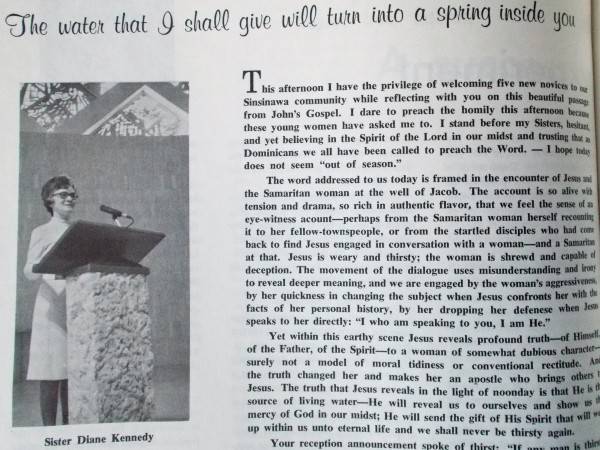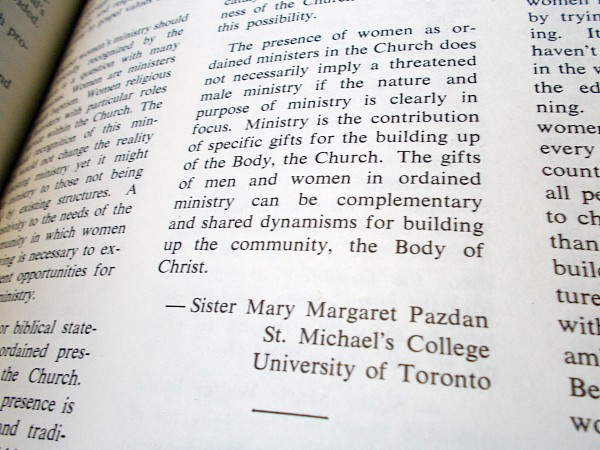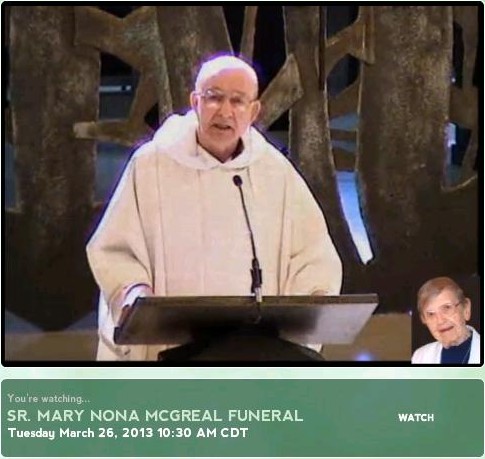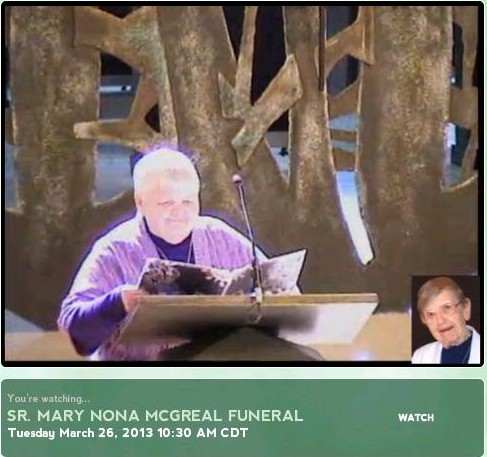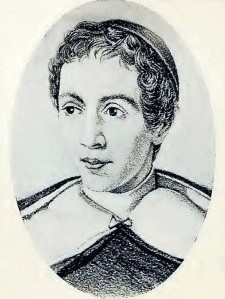The preaching of the non-ordained: why not sister homilists
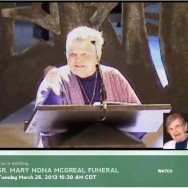
Why is the homily reserved to the priest or deacon alone? There is a deeper reason than the fact that the Church has assured their proper formation, education and training and commissioned them for that service. That reason lies in the unity of the Liturgy of the Word and the Liturgy of the Eucharist, and the intense orientation of the Gospel and the exposition of the Scriptures, toward the Eucharist, source and summit of the Christian life. The homily is ordinarily given by the priest celebrant of the Mass, or occasionally for a good reason, a concelebrant priest or one assisting “in choir”, or the deacon, but having some other person slip in to give the homily, who is not even ordained to the sacred ministry, is not really fitting for the integrity of the liturgy. The sacred minister in Holy Orders, consecrated and ordained as he is in his very person for service at the altar, is the one to open the Scriptures so that the people may receive and believe in Jesus Christ first in word, before receiving Him in sacrament. The canon law and liturgical law on this point follows from the theology of the Mass. It’s not that a non ordained person is functionally incapable of preaching a homily at Mass, or necessarily theologically unprepared, but it’s something even more than just a practical function.
But starting in the late 60s and 70s, amidst a heady sense liberation, a certain amount of experimentation with lay homilists occurred, and that was especially true with apostolic religious Sisters. Then-novice directress Sister Diane Kennedy’s homily was published at the beginning of 1973, in the Sinsinawa Dominican magazine exChange (official policy for which included “rocking the boat” with “occasional bombshells”). In that (ironically) still more innocent time, her feeling about preaching the homily was “hesitant, and yet believing in the Spirit of the Lord in our midst and trusting that as Dominicans we all have been called to preach the Word.”
The previous issue had asked: “Does preaching have a specific meaning for Dominicans? How can men and women of the order collaborate in the ministry of the Word?”
Giving homilies at Mass seems to be a topic close to the heart for Sinsinawa Dominicans. Consider a December, 1999 Sinsinawa Dominican email discussion list (SinsinOP) post:
I was back in my old parish [in Michigan] for Thanksgiving. Some of the Catechumenate Catechists gave me a gift of the air ticket and hosted the weekend. In conversation they asked if I was preaching at the Sunday liturgies. I said no, that women are not permitted to preach in Florida, that I knew that and had let-go of that ministry before I come to Florida and that I was happy in my present ministry.
Their response amazed me. They said, “isn’t that selfish, You may have decided to let-go of that issue but what about thew people that are deprived of that gift in you and also IN OTHER WOMEN.” They then asked how our community were working on that issue. I did not know how to respond. Since I came back I have been reflecting on the whole conversation and wondering if we as a congregation are doing anything as I do not remember it coming up in the Chapter discussions or proposals.
Is the LCWR working on this, she wanted to know; is there dialogue with the US bishops? She suggests this needs to be advanced for the sake of women religious of the future, and “SPEAKING TRUTH TO POWER”. One of the members of the Father Mazzuchelli Society founding group knew a Sinsinawa Dominican Sister in a local Madison parish some years back, who went through the distressing experience of being told she couldn’t preach at Mass anymore, and he and his wife “went through that with her”, humanly understanding and trying to support her, as friends.
Saint Dominic founded the Order of Preachers with different branches; friars, nuns, third order, called to live the charism differently, but all definitely preachers. In October of 1999, during a period of preparation for the Sinsinawa General Chapter meeting that occurs every 5 years, a SinsinOP post representing one of the local “circles” of Sisters, presented an idea:
WE PROPOSE THAT THE CENTRAL COUNCIL CREATE THE POSITION OF PROMOTER OF PREACHING AND INVITE PERSONS TO SUBMIT THEIR NAMES.
Timeline: By January, 2001
Our rationale: To enflesh our charism
To encourage our ownershop [sic] of the charism of Preaching
To officially acknowledge the work that has been done and continue the work with other Congregations
There had been for some years a Preaching Committee, but having a specific job position to “promote preaching” was established practice with the Dominican Friars, apparently a trend in other congregations of LCWR Dominican Sisters, and was greeted with approval. The General Chapter meeting in 2000 directed that a Promoter of Preaching be appointed, which was carried out in October of that year with the selection of Sister Alice Ann Byrne for a three-year appointment to the half-time position.
Sister Alice Ann’s December, 2001 review of her office’s activities in its first year included formation of an ad-hoc committee of Sisters which contributed “Spectrum [congregation magazine] articles on the realities of itinerant preaching as well as initiating regional/local conversations”, established regional preaching promoters, and “In collaboration with the Promoter of Justice, we are co-sponsoring Contemplation and Resistance Retreats; with the Promoter of Study, we sponsored Gospel Women Speaks; and presently plans are underway to sponsor a 2003 Forum on the challenges of our preaching identity, concentrating on the scripture study and skills necessary to ground preparation.” She also stated areas of concentration for the next year, 2002, which included: “We need to address the current legal restrictions which are interpreted to limit pulpit preaching to the ordained, especially within the context of Eucharist. This narrow definition of preacher must be addressed out of our belief that the People of God deserve to hear the Word of God claimed and proclaimed from within the life experiences of the entire community…women and men, lay and ordained.”
The Sinsinawa Dominicans’ entrenched dissent on the matter of preaching homilies at Mass needs to be understood in the context of the Order’s sustained efforts on this matter at the national and international level. That past summer, the 2001 international General Chapter meeting of the Dominican Friars had been held in Providence, Rhode Island, and at that meeting a special Commission had presented its report, “The Dominican Charism of Preaching: An Inquiry“. It called for further study “to advance the question of liturgical preaching by qualified and gifted non-ordained members of the Order and the Church”, and “that some structure be established to document the many ways that the Dominican friars, nuns, sisters, and laity are already collaborating in the preaching mission of the Order throughout the world”, which they hoped would be a resource to the wider Church, which (perhaps forgetting about the existence of parishes) they claim “lacks effective structures for collaboration in ministry by women and men, lay and ordained.” It concluded with an (absurd and scandalous) recommendation “that the Order request from the Holy See permission for the ordination to the order of deacon of apostolic Sisters who are charged with preaching and ministries of the word” (this was commented on by both Sisters and laity in a subsequent international Dominican Charism of Preaching survey collation document, and Sinsinawa Dominicans were also to be found publicly discussing “women deacons” soon after, for instance in the magazine US Catholic. The same year at least one Sinsinawa Dominican was involved in distributing copies of a book advocating women deacons, to every US bishop in advance of a November, 2001 USCCB meeting: “I felt that because women deacons could canonically preach within the Eucharist, our Dominican calling, I entered enthusiastically into this campaign.”). A successor Promoter of Preaching, Sister Mary Margaret Pazdan, gave a useful timeline of the Order’s efforts to promote lay preaching in a 2004 SinsinOP message.
The news on this topic coming out of the friars’ July-August 2001 General Chapter seems to have caused a stir; the Sinsinawa Dominican Promoter of Preaching certainly would have been aware, and I wonder if it also came to the attention of the US bishops’ conference. Sister Alice Ann’s email asserting the need to prioritize advancing the cause of lay liturgical preaching came a month after the US Bishops’ approval of a new complementary canonical norm for the United States (the “new” norm was a reiteration of an already authoritative 1997 Instruction from the Holy See, that spelled the matter out strongly and clearly) which was ratified by Rome, and a month prior to its coming into effect January 15, 2002:
The diocesan bishop will determine the appropriate situations [when the lay faithful may be permitted to preach in a church or oratory] in accord with canon 772§ 1. In providing for preaching by the lay faithful the diocesan bishop may never dispense from the norm which reserves the homily to the sacred ministers (cc 767§1; cfr. Pontifical Acta Apostolic Sedis (AAA) 79 [1987], 1249). Preaching by the lay faithful may not take place within the Celebration of the Eucharist at the moment reserved for the homily.
Although you would think a “Promoter of Preaching” would become aware of this quickly, that was apparently not what happened. In April of 2002, Sister Alice Ann Byrne informed SinsinOP members: “When you receive your Spectrum packet of inserts this month, you will find a brochure entitled ‘What’s the Good Word on Lay Preaching?’. It comes from Future Church, a ministry of Call to Action. I think it presents a thoughtful discussion of the importance of lay preaching and some scholarly interpretation of the 1983 Code of Canon Law. See what you think.” Spectrum is an official Sinsinawa Dominican congregation magazine (a less-boat-rocking successor to exChange, the boat-rocking having migrated to SinisnOP), so this reference is apparently to literature distributed by the congregation to the members. The text of this Call to Action/FutureChurch brochure on lay preaching still appears in HTML format on the website of the notorious activist dissent group. The brochure claims that there are a variety of instances when the Church allows lay people to preach the homily at Mass, and urges: “Discuss the issue with your pastor or liturgy commission to see if there is an openness to lay preaching. Encourage lay preaching at daily Mass and at special non-Sunday liturgies, with the goal of including more lay preaching on Sundays.”
In actuality, the “new” US canonical norm was a reiteration of an already authoritative 1997 Instruction from the Holy See, that spelled the matter out strongly and clearly:
The homily, therefore, during the celebration of the Holy Eucharist, must be reserved to the sacred minister, Priest or Deacon(69) to the exclusion of the non-ordained faithful, even if these should have responsibilities as “pastoral assistants” or catechists in whatever type of community or group. This exclusion is not based on the preaching ability of sacred ministers nor their theological preparation, but on that function which is reserved to them in virtue of having received the Sacrament of Holy Orders. For the same reason the diocesan Bishop cannot validly dispense from the canonical norm(70) since this is not merely a disciplinary law but one which touches upon the closely connected functions of teaching and sanctifying.[…]
All previous norms which may have admitted the non-ordained faithful to preaching the homily during the Holy Eucharist are to be considered abrogated by canon 767, § 1.(72)
The Call to Action/FutureChurch brochure was based on perceived loopholes in canon law that had actually been completely closed (although, as an example of creativity with loopholes, in March 2002 a Madison-area Sister suggested on SinsinOP: “A parish might see Good Friday as a day that a non ordained person might preach since it is not a Eucharist.”) by the new canonical norm for the United States issued in January 2002, three months prior: non-ordained persons may never preach at Mass during the time for the homily. And subsequently, the 2004 liturgical law document Redemptionis Sacramentum would reemphasize the Church’s discipline yet again, saying that the practice of non-ordained persons giving the homily at Mass is “reprobated”; this also indicates it cannot be dispensed even by the diocesan bishop.
On May 10th, 2002, Sr. Alice Ann Byrne had finally become aware of the new canon law norm that had come into effect four months previously, and wrote on SinsinOP:
Last week I was surprised when I read in a column in our Spokane diocesan newpaper that through a recent decision of the American Bishops all lay people are restricted from preaching at Eucharist except before liturgy and after communion. All interpretive options within the canons seem to be entirely shut down and the preaching limited to the ordained. Recently an article interpreting this decision was written by Audrey Borschel, an Aquinas doctor of ministry student and was sent to the promoters of preaching by Greg Heille,OP. It is published on NCR online, Viewpoint, entitled “Excluding Lay Preachers Stifles the Spirit.” If you have the time and interest it is worth reading.
Borschel’s website says she has “good memories of sharing pastoral care with the pastor while a pastoral associate in the Catholic Church,” though she is now “an ordained minister” with the Disciples of Christ protestant sect.
Many sisters’ desire to preach the homily at Mass is intertwined with their hopes for “women’s ordination”. Catholic teaching is that the Church has no authority whatsoever to ordain women as priests; it is not simply a disciplinary matter, but a doctrinal truth that cannot change, and Catholics who refuse to assent to it set themselves in opposition to Catholic teaching. In 2003, a South African Dominincan Sister with a doctorate in theology and credentials as a courageous justice campaigner who had been jailed for racially integrating the school she led and saw the “rule” against women’s ordination as another kind of apartheid, Sister Patricia Fresen, OP, underwent “ordination” ceremonies in Barcelona, Spain,–which of course didn’t actually make her a Catholic priest, and for which she incurred excommunication. At that time there was a big push for “women’s ordination” in Europe; it is not clear whether she also felt encouraged by the commission report to the 2001 Dominican friars’ General Chapter held in Providence, that advocated “ordination” of sisters as deacons. She believed she was now a priest (later, she was “ordained a bishop” and became one of the leaders of “Roman Catholic Womenpriests International”), and Fresen’s reasons for her action, which was inspiring to some or perhaps many Sinsinawa Dominicans, were detailed in a message forwarded to SinsinOP in October of 2003:
I believe that Canon 1024, which states that a person must be a baptized male in order to be ordained, is an unjust law and therefore needs to be broken.
As a woman theologian in the church, I have often felt pushed aside and denied opportunities of preaching and pastoral ministry because I am a woman.
In 2004, the Sinsinawa Dominicans’ General Council expressed gratitude for Sr. Alice Ann Byrne’s service, and appointed Sister Mary Margaret Pazdan as the next Promoter of Preaching, again for a 3-year term. At that time Sr. Mary Margaret was a Visiting Dominican Scholar at at the secular Emory University in Atlanta, but would soon return to teach Scripture at the Aquinas Institute of Theology in St. Louis, “the only Catholic institution in the world offering a Doctorate in preaching“. Before the creation of the Promoter role, Sister Mary Margaret had been the convener of the congregation’s Committee on Preaching. She had also long favored “women’s ordination”; for instance this was from 1974 in the Sinsinawa Dominican publication exChange:
Sister Mary Margaret Pazdan periodically posted homilies she had preached (as did others), not all necessarily at Mass (some 2005 examples: 1a 1b 2 3 4). I do not feel strongly about their content one way or another except that I find them not specifically Catholic. Sr Mary Margaret had also produced feminist language translations from the original Greek of New Testament readings and canticles, for the US Domincan Sisters’ ecclesiastically non-approved “prayer resource” resembling the Liturgy of the Hours, Dominican Praise, released in fall of 2005 (its male-language-eschewing doxology: “Blessed be our saving God, Creator, Christ, and Spirit, now and forever. Amen.”). She did collaborative initiatives with the Promoter of Justice, such as prayer and fasting for peace in Iraq, and promoted preaching education and enrichment for the Sisters and sought such opportunities for herself, such as attending in December 2005 the annual meeting of the Academy of Homiletics, an organization of teachers and doctoral graduate students of homiletics. With majority protestant membership, this event featured daily protestant services and preaching. The major Catholic speaker was trendy, controversial feminist and panentheist theologian Sister Elizabeth Johnson, whose plenary talk, “Like a Sponge in the Sea: Preaching and a Spirituality of the Earth”, according to Sister Mary Margaret, advised:
First, be contemplative and delight in the universe and goldfinches. The cosmos has intrinsic value to God. Second, be ascetic and exercise discipline in using the resources of the earth. Fast from shopping. Third, be prophetic and act for justice of the earth….
Sr Mary Margaret also was busy in November, 2004 urging participation in the Order’s international questionnaire/survey on the Charism of Preaching, which asked: “How have you lived the preaching charism of the Order?” and “What are your personal experiences of being a Dominican preacher?”
The famed Dominican house of Santa Sabina in Rome collated the results of this vast survey, which was another stage in the same chain of lay preaching-related initiatives that had included the report to the 2001 General Chapter in Providence, and done in response to a commission recommendation to “continue the theological and canonical study necessary to advance the question of liturgical preaching by qualified and gifted non-ordained members of the Order and the Church”, in a 2006 document. “There is much more to our preaching mandate than ‘liturgical preaching’. We have a broad responsibility in our calling,” says the document, the author of which seems fairly well-grounded. “Laypersons are not permitted to preach a homily,” and “The Order may not have the power to procure a change on this matter, and petitioning of the Holy See appears pointless with regard to the current position of the Holy See on this matter,” however examples of lay preaching in the context of the Mass, and the opinions of Dominicans who advocate this, are mentioned neutrally. Some lay Dominicans are revealed to have been uncomfortable with the 2001 report calling for women deacons, while some Sisters spoke of that positively. Many lay respondents to the survey felt that too much emphasis on liturgical preaching “does not adequately address the extra-liturgical preaching that is in the spirit of St Dominic himself.” Among Sisters, “the issue of the exclusion of the non-ordained from liturgical preaching, and therefore the total exclusion of women from liturgical preaching, was strongly felt.”
Strongly felt, but not always strongly adhered to, as SinsinOP posts attest,–either in a parish, or amongst fellow Dominicans, as on Sunday, March 19th, 2006, at the Sinsinawa Dominicans’ General Chapter Meeting, at a Chicago hotel,
The brilliant sun greeted all who gathered to celebrate Eucharist at 9:00. Our presider, Don Goergen, O.P. began by inviting all to take a moment to look around and to absorb all the beauty, wisdom and holiness gathered in that sacred space. The music was glorious, the dancers graceful and the preaching by Teresa Byrne, O.P. was profound. She invited us to drink deeply at the well, as she reflected on that familiar story of Jesus who long ago met another woman at the well.
Leading friars supported and cooperated in Sisters’ preaching at Mass. In September, 2006, the national Dominican Leadership Conference, a group for the leaders of Dominican friars and sisters in the US, held its annual meeting at Sinsinawa Mound. As I write this, the DLC’s DomLife website still has a photo of Sister Toni Harris at the ambo in the Sinsinawa Queen of the Rosary chapel, giving the Sunday Mass homily, with a link underneath: “Read Toni Harris’s Homily (Word)“. In her words on the Old Testament reading, which prefigures the way in which Jesus, the Just One, would be reviled by some, Sister Toni asks us to reflect: “What voice of truth is ‘obnoxious’ to us? What truth ‘reproaches’ us or charges us with ‘violations of our training’?” She says that for her that’s the voices reminding about voluntary poverty, in a time when we are all participants in a society of rampant consumerism.
Next year, at the October, 2007 Dominican Leadership Conference, there were noteworthy talks by keynote speaker Father Daniel Cadrin, OP, and Sister Mary Catherine Hilkert of the Akron Dominicans. In February of the same year, these two members of the Order’s International Preaching Commission had served as US representatives to an international Preaching Conference at Santa Sabina, which reiterated yet again in a letter to the Order that one of two main “challenges that face us” was “(2) the authorisation for preaching by the non-ordained in the liturgical context.” Father Daniel’s DLC talk included this:
At the Commission on Preaching, we have to work on the issue of preaching in a liturgical (Eucharistic in fact), context for OP women. It raises questions related to our mission but first more with the issue of vocation and ministry. In the eighties, I was part of a small OP community in a new suburb, south-shore of Montreal. There (as in other places at that time), at the eucharist on Sunday, at the parish, the woman who was coordinator of this assembly used to preach. There was then no problem; she was mandated by the bishop and she was accepted by the people. We thought then that this was the beginning of a new era that would lead to deeper changes. As you may have noticed, it is not yet the case.
[…T]o remain faithful to our OP tradition, we have to face this issue with three concerns: we are part of the Church, not outside it; we want to be prophetic, calling the Church and ourselves to renewal; we are part of a Family of Preachers, not isolated units.
Sister Mary Catherine Hilkert went in depth into the matter in her reply presentation. She noted that lay preaching “has long been a passion of the DLC, of congregations of Dominican apostolic sisters, of many members of the Dominican laity and associates, and of many of the friars in the USA” and that this was strongly reflected in the Charism of Preaching survey, the results of which had been collated in 2006 by Santa Sabina.
But in the larger structures of the institutional Church at the present time, preaching by qualified and gifted lay persons is one of those construction projects that has been ignored, dismantled, not funded, or not considered a priority. The focus of recent documents from Vatican congregations has been on restricting, rather than expanding, authorization of lay preaching in the liturgical context. This concern is too important to give up on and I think we need to be at the forefront of keeping the question alive.
Although, she said, there was a need to “offer solid theological, biblical, and liturgical grounding for expanding the authorization of liturgical preaching by qualified baptized, but non-ordained, persons”, petitions to change canon law weren’t the best way forward “in the present ecclesial climate”. Rather, collaborative ministry of friars and sisters and even laity seemed the most promising way around the roadblocks. She advocated also reframing: “Given the rhetoric that we often use in the United States, I think it is important –not just strategically, but also theologically–to shift our language from speaking of ‘our right to preach’ to the vocation and mission to preach.”
Shortly after it was delivered at the DLC meeting in 2007, Sr Mary Catherine Hilkert’s talk would be studied by the Sinsinawa General Council as “proximate preparation for our Congregation plan to engage each other about the future of religious life and our future”, together with an article titled “What Religious Life for This ‘Other Possible World'” which seems to be about “decentering religious life from itself”, and an article by the Dominican Sisters’ NGO representative to the United Nations.
Efforts to implement the collaborative preaching concept included the formation in the US of Dominican mixed “preaching teams“, such as the retreat preaching pairing of Sinsinawa Dominican Sister Ann Willits (who certainly does also preach homilies at Mass, given the opportunity, see photos below) with Fr James Marchionda or a a priest I will refer to here as Fr. M out of consideration because as I write this he is gravely ill (please pray rather than judge; this goes for everyone you read of here). It is certain that the latter permits sisters to give homilies at Mass, for instance approximately daily during the Sisters’ April 2011 General Chapter meeting: Father M is noted as celebrant of the Eucharist, with a Sister preacher named, on the 6th, 7th, 8th (when the homilist was Sister Mary Paynter, the vice-postulator of Fr Mazzuchelli’s cause for beatification.), and on the 10th, a Sunday. [There had been a bizarre controversy on SinsinOP shortly before that Chapter, however, which may help us to suitably appreciate the fact that they actually had a priest and Mass: Sister Donna Quinn wrote, entirely seriously, “Looking at the Agenda sexism through the use of the word Eucharist….We have a lot of educating to do in this Community by our Leadership when one of the first items covered is to hire a male priest to lead us in prayer every day. I know I will be boycotting this time.” Another Sister, however, was “very grateful to the hard-working Agenda Committee and liturgy planners who invited our brother M[…] to join us as Presider. When I heard M[…] was coming, I thought: what a gift to have one of our brothers with us! His presence will be a daily reminder for me of our wider family.”]
The Sisters do not seem to have considered seriously enough that they may not be called at all to preach at Mass, that it is not truly fitting, that that is not at all important to apostolic sisters’ expression of the Dominican charism, and that their disobedience is not the sacra praedicatio, the holy preaching. The founder of the Sinsinawa Dominincans, Father Samuel Mazzuchelli, wrote in a commentary on the Domincan Sisters’ Rule, about how the Sisters would fulfill the Dominican charism:
The Sisters, then, in teaching the Christian doctrine, by words and example, to the children of this country, where they are exposed to lose their faith, do fulfill the main duty of their vocation, and become the true children of their Patriarch [ie, St Dominic], and worthy of the name of the Order of Preachers.
And this does not appear to have been viewed by Father Mazzuchelli as something lesser than the different and complementary apostolate of the friars:
The Dominican Sisters, by joining the army of the Church Militant against error and sin, become active members of the militia of Jesus Christ, according to their original vocation, which is the most glorious and exalted station in human life, and well worth leaving their homes, their relatives and all worldly affections, in the well grounded hope of that exceedingly great reward, the entire and eternal possession of God the Father, Son and Holy Ghost.
This goal of the Christian life has been supplanted for some by the exciting temptation of “liberation” according to worldly criteria, ignoring Catholic tradition, discipline and doctrine,–as in one of the most radical Sinsinawa sisters’ October 24, 2008 SinsinOP post:
Nora and I attended the first Eucharist of an ordained Roman Catholic woman here in Bay area. She followed the Roman Catholic ritual, it was prayerful, the homily was inspiring. She was obviously carrying out what she felt called to do. It was an act of worship, an act of service; it wasn’t a performance or a call to arms. The church was crowded, and so far — no excommunications. Kaye Ashe
This is going way, way too far down the slippery slope. And Kaye Ashe is not a marginal figure in the community, but a past Prioress General. Acceptance of lay homilies is certainly not identical with the acceptance of “women’s ordination” (an impossibility, the belief in which confuses people and endangers ecclesial communion), but these interests often do reenforce each other. The results of that are extremely destructive.
Here in the local Madison area, we experienced the tragedy of a liberal community of LCWR Benedictine Sisters that “went non canonical” and left the Church, now running a kind of pseudo-parish that hosts activist dissent groups like “Call to Action”, “Dignity”, and “Women’s Ordination Conference”, and features lay-led Sunday services they falsely claim are the same as Mass. Yet this place, Holy Wisdom Monastery, continued to enjoy the support of some other religious, including some Sinsinawa Dominicans who continued to often give talks there, particularly the Sisters who ran Wisdom’s Well Interfaith Spirituality Center near the Sinsinawa-sponsored Edgewood College in Madison, and local Call to Action member and Edgewood Campus School trustee Sister Clare Wagner. In late 2012, the Wisdom’s Well sisters, who liked to also give talks at Catholic parishes, were quietly not approved to do so by Bishop Morlino, citing the religious indifferentism evident on their website. The confidential notice to priests was leaked (the SinsinOP evidence suggests this was by prioress Sister Mary Ellen Gevelinger) to the press, and the sisters were claimed to be victims of a baffling persecution. At a General Council meeting at Sinsinawa Mound a couple weeks later, they were heroes:
On Wednesday, Dec 5 we had the privilege of spending the morning with our valiant women from Wisdom’s Well – Maureen McDonnell, Lynn Lisbeth and Beth O’Brien. We prayed together, shared feelings and experiences and discussed how we want to proceed into the future. We will continue to follow our contemplative stance, engage in conversations with professionals including canon lawyers and provide the media with our response of support of these women. At noon in the dining room Mary Ellen informed our sisters of the presence of the three who were then greeted with a standing ovation, a very moving event that will linger with us. The three entertained long lines of sisters who wished to greet them and personally share their support.
Even though it was public knowledge that the third staff member, Beth O’Brien, was a Holy Wisdom Monastery oblate, I don’t know how many of the Sinsinawa Dominican Sisters understood Sr. Maureen and Sr. Lynn were going to Holy Wisdom (and I have no idea whether Bishop Morlino knew), or the gravity of what was going on there. I knew it from reading Holy Wisdom’s newsletters on their website. I seized the opportunity created when political celebrity Sister Simone Campbell visited Holy Wisdom Monastery to preach at their service on Ash Wednesday of 2013, and I delivered to Sister Simone and the former Benedictines a document of testimonies from local parish lay people who don’t believe Catholics should support Holy Wisdom Monastery. Because one or more priests attended a related event at that place the following day, Bishop Morlino sent out a confidential letter (later leaked–again) to let priests know that they are forbidden to go there. As of right now, for whatever reason, there are no longer any Sinsinawa Dominicans on their schedule to give talks, either.
I’m cautiously hopeful for the Dominican Order, because the most recent communications from the international level do not seem to have the tone of activism in favor of women preaching at Mass. In January, 2012, a new Master General, Fr Bruno Cadoré, sent a rather profound and moving letter to the Order for a Year for Women and Preaching that had been entered into; this was of course passed on to the subscribers of SinsinOP. This letter only acknowledges the topics of women preaching at Mass, and ordination, before gently pointing us in other directions.
In speaking of Dominican women and preaching, it is not my desire to elaborate here on the topic of complementarity, which is so evident, nor on the topic of ordination and the ministry of preaching. As you have understood by now, the issue is not primarily what is done, rather what is contributed to the common good of the holy preaching, and how we may together be organized to receive what is offered.
There is realism and compassion here:
I believe that when we speak of Dominican women in their relation to preaching, we must recall the difficult experience that many congregations of apostolic sisters and several monasteries of the Order are facing today. After years of growth and development, there is no sign of relief for the immediate future. We must face this challenge together, supporting one another in his or her own specificity and autonomy, while also witnessing that the mission of preaching, carried out together, is on one hand the fruit of all that has been sewn [sic] before us, and on the other hand, larger than the specific mission of any given institution. I cannot ignore the fact that it may be difficult to face concretely such a test in a realistic and creative manner, without resignation nor obstinacy. We must make an option for true hope in life, even when we perceive death up close, even when a large numbers of houses must be closed, and many beloved sisters laid to rest in the ground. During this transition, we are in absolute need of our solidarity and our unity, so that we can prepare the future of the mission of the holy preaching based on our present strengths.
Meanwhile, the Sisters have kept on preaching at Sinsinawa Mound Masses, on selected occasions. Some are even occasions when the public is especially invited, such as Christmas Day Mass. Last year they started putting videos online, particularly of funeral Masses, so that far-flung members, associates, and surviving family members could watch. I blogged one occasion of a sister homilist in a video on my personal blog in January. These videos are perfectly public and linked from the Sinsinawa.org website.
During Holy Week came the funeral of a most revered Sinsinawa Dominican Sister, Mary Nona McGreal. She was almost 99 years old, and had been professed almost 80 years. Sister Nona had been the president of Edgewood College who built up much of the campus, and the great historian of the congregation’s founder Father Samuel Mazzuchelli. It was she who wrote the Positio for his sainthood cause, on the basis of which the declaration was made of his heroic virtue, leading to his being named Venerable. Into her very old age, she continued to work on the history of the Dominican Order in the United States. She received a special honor at the 2006 Dominican Leadership Conference meeting, and at Dominican University (formerly Rosary College) in Chicago there is a McGreal Center for Dominican Historical Studies. It pains me, but there was a sister preacher at her funeral Mass.
Here is the priest, who read the Gospel and spoke for a minute and a half:
The book of Ecclesiastes in that first reading said that “there is a time for everything.” And Sister Mary Nona had her own way of putting that as we see on her funeral card: “Providence finds everything in due time.” And so, when a beloved friend like her dies, there is a time for silence and grief. But there is also a time for speaking. Speaking in gratitude and reverence for this Sister who has so blessed our lives. An appropriate time not only to speak, but an appropriate time to have a particular person speak, who knew and loved her, and who can help us, in the light of our faith, to see the meaning of Sister Mary Nona’s work in life, for us who are better persons for having known her. So, this is the appropriate time to ask Sister Ann Willits to share some thoughts with us.
Sister Ann looks very pleased. Of course, this is precisely not the appropriate time for Sister Ann Willits to speak. “Preaching by the lay faithful may not take place within the Celebration of the Eucharist at the moment reserved for the homily.” That’s canon law. What she’s doing here is not the holy preaching. 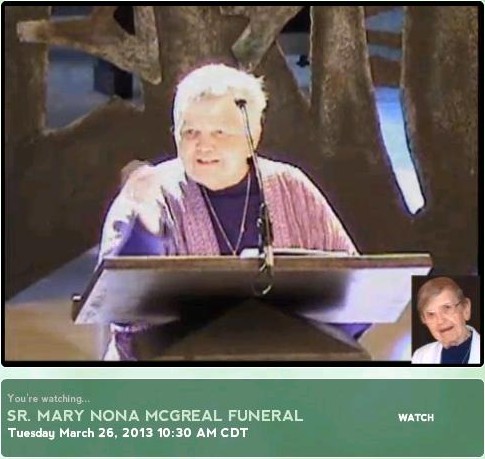
She is skilled as a speaker and can do much good speaking at other times. Dominican Sisters International is focused on the New Evangelization this year; someone like Sister Ann could do a lot to help invite fallen-away Catholics to return to the Church and the Sacraments and the life of Grace, and to train other Catholics in speaking skills so that we can help with that too.
It is the position of the Father Mazzuchelli Society that Sinsinawa Dominicans are intrinsically good, that one cannot even conceive of the great intrinsic beauty and dignity of their souls, because made in the image of God, that they are loveable, that they are called to holiness, and that they must not preach homilies at Mass, and that the Dominican Order needs to permanently stop advocating in favor of lay homilists.+



